
Australian Institute of Marine Sciences (AIMS)
The Australian Institute of Marine Science (AIMS) is Australia’s premiere tropical marine research agency. AIMS plays a pivotal role in providing large-scale, long-term, and world-class research that helps its stakeholders including governments, Traditional Owners, research management organisations, industry, and the wider community, to make informed decisions about the management of Australia’s marine estate.
Its mission is ‘to provide the research and knowledge of Australia’s tropical marine estate required to support growth in its sustainable use, effective environmental management, and protection of its unique ecosystems’. AIMS’ research programs are built around core strengths and strategic capabilities that meet the knowledge needs of stakeholders.
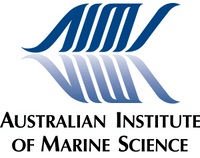
Partnership Overview
ACEMS’ long-standing partnership with AIMS continues to strengthen and grow in depth, breadth, and positive environmental, public education, and potential Indigenous cultural impacts.
As testimony to this, the scope and value of the collaborations and engagements between ACEMS and AIMS in 2020 exceeded activity in 2019, and again exceeded forecasts and annual estimates of in-kind value contribution.
AIMS and ACEMS partner to address challenging methodological problems along the entire research pipeline, including data collection, dynamic modelling, data analysis, and communication of insights, including via briefings to key decision-makers. ACEMS also helps AIMS to harness AI technology, expertise, and citizen science to support its mission.
Additionally, AIMS and ACEMS have continued to support researchers, including research students and early to mid-career researchers, flagship projects, and new research and opportunities. Research capacity and resources have also been extended through joint applications for external research funding and involvement of other stakeholders to support important data collection efforts.
The partnership is also committed to public engagement, including through education and free resources and tools to support citizen science and school curriculums.
Research Collaboration Highlights in 2020
AIMS-ACEMS partnership engagement and collaboration highlights for 2020 include:
- In-kind contributions exceeding 2019 contributions and estimates for 2020
- AIMS-ACEMS co-funded research fellow David Warne’s appointment and visit to AIMS (January 27-31) in Townsville to meet with collaborators across the organisation
- Eight research briefings for key stakeholders of Great Barrier Reef Coral Recovery research, including AIMS, and one for scientists at the Office of The Great Barrier Reef (OGBR)
- Multiple research planning sessions (along the research pathway) and team meetings for all projects, and introductions to new team members including Stakeholder Engagement Coordinator and research assistant
- Collaborations which are transdisciplinary, engage multiple researchers at AIMS, and multiple other collaborating organisations including most recently two Indigenous organisations
- Significant developments in relation to the high impact projects, including: Virtual Reef Diver (new educational resources; new data; research on increasing trust in citizen science; new eResearch support); ReefCloud (published demonstrated benefits of AI use in automated image classification; modelling work); completion of one year GBR Recovery Project; and "Monitoring through many eyes: Integrating datasets to improve monitoring of the Great Barrier Reef"
- Research outputs for projects including the following publications and open source tools:
- “Monitoring of Coral Reefs Using Artificial Intelligence: A Feasible and Cost-Effective Approach”
- “Forecasting intensifying disturbance effects on coral reefs”
- “Bayesian item response models for citizen science ecological data”
- development of mathematical models and statistical methods
- open source software packages for use in research and citizen science
- contributions to management reports, including for government (DFAT)
- reef observation data
- tools for use in ecology, citizen science, and conservation
- new educational products (including biological curriculum practical and application) were developed, promoted, and introduced to the education system (pilot trial) to benefit teachers, students, science and marine ecosystems
- One successful ACEMS Industry Collaboration Support Scheme (ICSS) project application for “Supporting Traditional Owner Marine Monitoring Through Two-Way Knowledge Sharing”
- Joint application led by AIMS for funding as part of the ARDC platforms call
- New project proposals, new projects, new student and RA, new funding granted (including for new research project and maternity leave replacement of ACEMS AI Julie Vercelloni)
- Indigenous Engagement training (ACEMS researchers and Stakeholder Engagement Coordinator) included in “Our Knowledge Our Way” best practice guide and launch by CSIRO
Collaborative projects:
Key collaborative projects in 2020 include the following (as detailed further below):
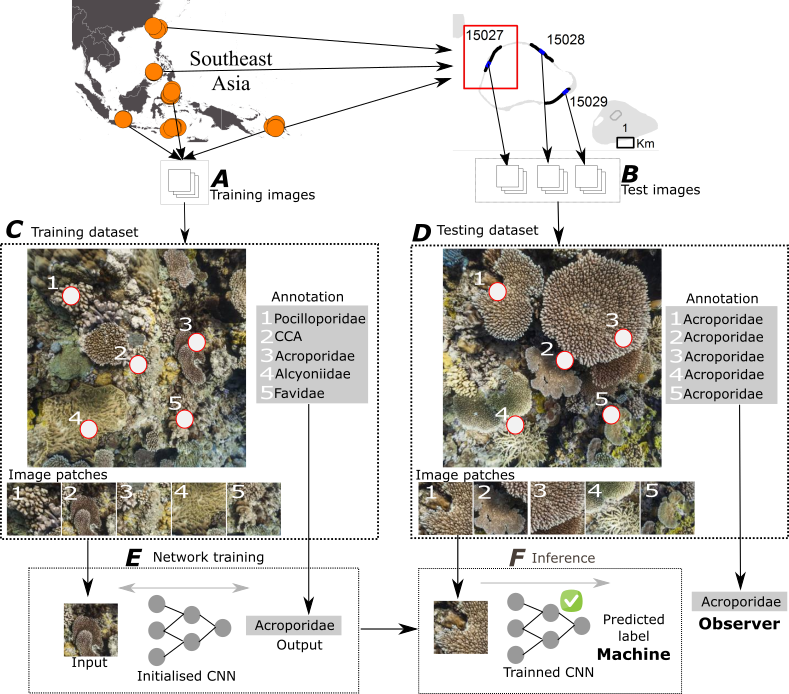
Methodological diagram to illustrate the workflow used in this study for training and testing Convolutional Neural Networks (CNN) for coral reef benthic monitoring.
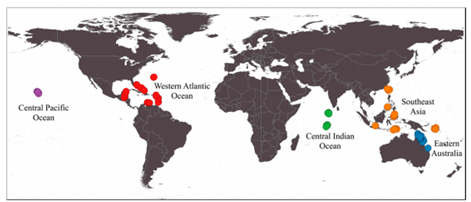
Global regions where performance of automated image annotation was evaluated
Demonstrating the use of AI technology for monitoring coral reefs.
A multi-organisational research team including AIMS researchers and ACEMS AI Julie Verceloni has demonstrated how artificial intelligence, and specifically Deep Learning Convolutional Neural Networks, can be harnessed to monitor coral reefs and realise significant benefits, including cost savings, productivity gains, and freeing researchers from classification work.
Digital imagery has greatly improved the speed of underwater data collection for monitoring benthic communities, image analysis remains a bottleneck in reporting observations. In recent years, a rapid evolution of artificial intelligence in image recognition has been evident in its broad applications in modern society, offering new opportunities for increasing the capabilities of coral reef monitoring.
Performance of Deep Learning Convolutional Neural Networks (CNN) for automated image analysis was evaluated in this study.
They found high agreement (97%) between expert and automated observations. Using this automated approach, data analysis reporting can be accelerated by at least 200x and at a fraction of the cost (1%).
Read the paper “Monitoring of Coral Reefs Using Artificial Intelligence: A Feasible and Cost-Effective Approach”, published in the Journal Remote Sensing in 2020 for more details.
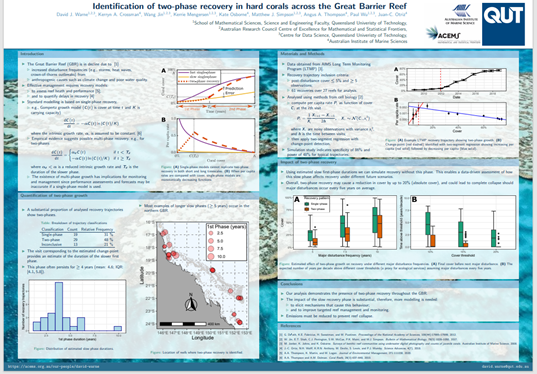
Understanding the recovery dynamics of coral is critical, given the Great Barrier Reef (GBR) is under threat as climate change continues to cause increases in the frequency and severity of acute and chronic disturbances to coral reefs. In this one year project, collaborators harnessed cross-disciplinary insights and pursued research identifying a two-phase recovery in corals, with a slower first phase of recovery. They warned of significant risks, and profound negative impacts, which may previously have been underestimated. They found that, across the Great Barrier Reef, a large proportion of reefs that have experienced large disturbances (i.e., reducing coral cover to < 5%) experienced a delay period in which the intrinsic growth rate is slower than expected. The expected delay duration has been quantified. Model extensions have been discussed aiming to better capture coral recovery after severe disturbances for use of reef condition reporting and management.
This knowledge will be paramount to enable effective monitoring and management of coral reefs within the GBR. Key research findings were communicated to stakeholders, including via official research visits and briefings, including an external briefing to the Office of Great Barrier Reef by AIMS’ Juan Ortiz and ACEMS Research Fellow David Warne on their project “Characterisation of initial periods of recovery within the Great Barrier Reef” and potential implications for reporting.
Watch the ACEMS public lecture by AIMS’ Juan Ortiz or view a full version of the research poster.
ACEMS research supports the ReefCloud online reef monitoring platform for reef management. In collaboration with AIMS’ Manuel Gonzalez Rivero, ACEMS AI Julie Vercelloni has worked on developing advanced models and machine learning technologies for ReefCloud, to ensure that critical monitoring - in the face of increased pressure to coral reefs - remains accurate, compatible and collaborative to support coral reef conservation.
ReefCloud Open Platform for Marine Scientists & Reef Management
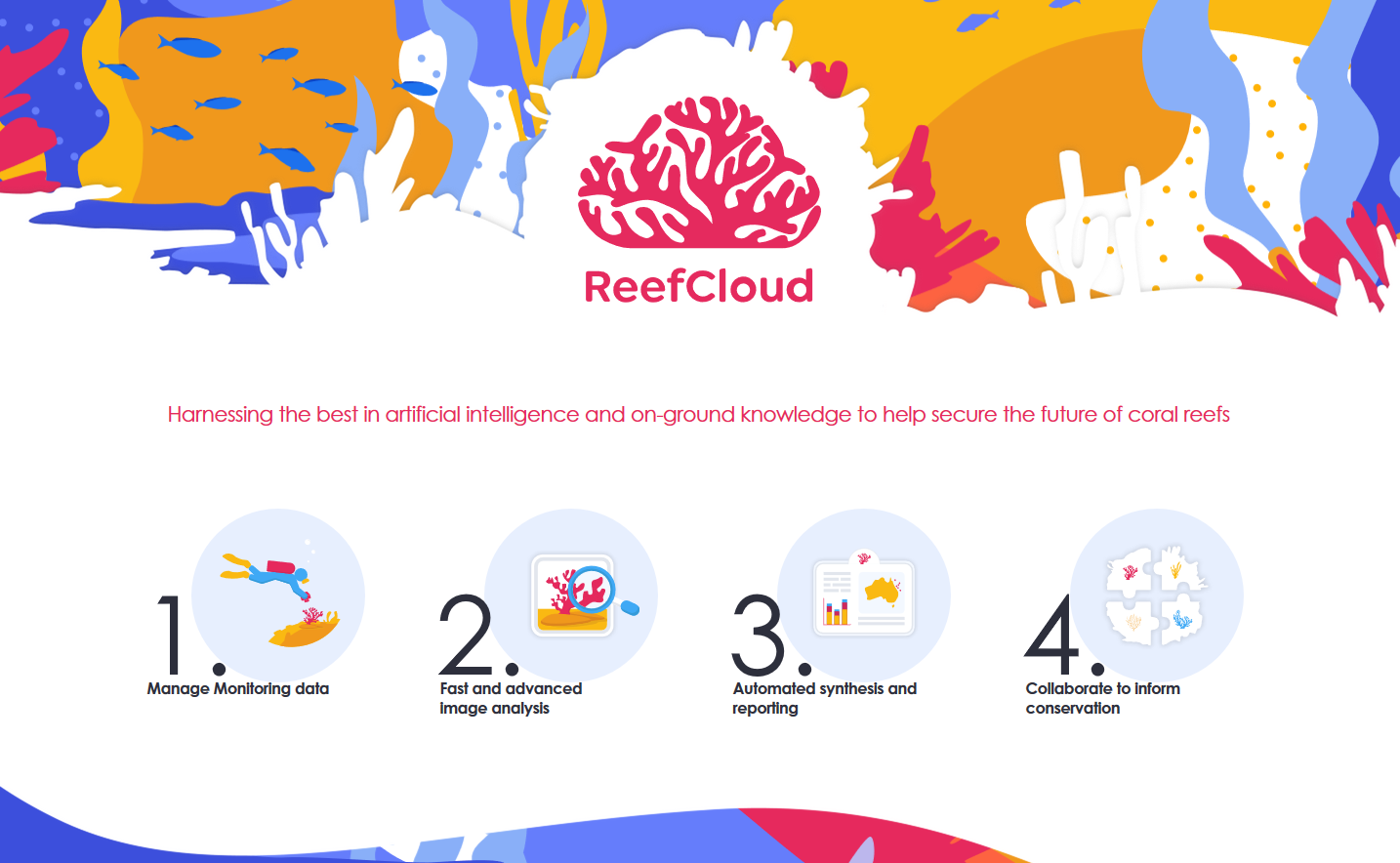
Source: ReefCloud
ReefCloud is an open-access platform that quickly and efficiently collates data to inform reef management decisions.
Guided by end-users and using cutting-edge technology in data science and machine learning, ReefCloud helps reef scientists to:
- manage, archive and share monitoring data
- fast-track the recording of change to reef communities using automated technologies (AI) collaborate and communicate widely on our understanding of where and how coral reefs are changing
Julie Vercelloni’s work includes statistical modelling for coral reefs (including consideration of coral cover model candidates and covariates) the development of workflow documentation, open source code, and a statistical package in R, for integration in the ReefCloud system; and provision of documentation to support AIMS reporting (including to DFAT).
Her work on ReefCloud will continue. Planned research for 2021 and beyond includes: advice about monitoring protocols across Australia (e.g., GBR & NT) and other regions including the Palau archipelago in the Pacific; spatio-temporal statistical modelling, including coral cover and functional group models, and development of workflow documentation and open-source code in R statistical package for integration in the ReefCloud system; advice to AIMS regarding reporting metrics and visualisation tools for communication of model outcomes, suited to end users, including Traditional Owners, in Australia and other regions (Palau, GCRMN, NAMMA); report spatio-temporal model results and provide input, including regarding statistical modelling, into reports.
Related collaborative research projects supporting ReefCloud include:
- Research on AI for image classification for use in reef monitoring (see project detailed above)
- New ICSS project “Supporting Traditional Owner Marine Monitoring Through Two-Way Knowledge Sharing
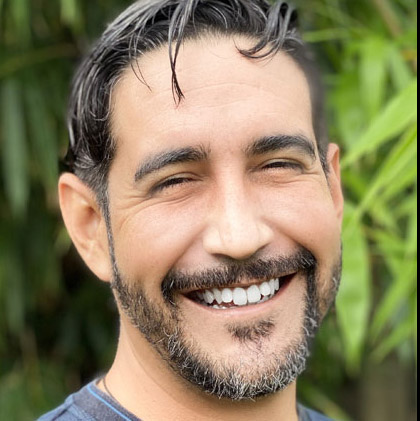
Manuel Gonzalez Rivero
AIMS’ Manuel Gonzalez-Rivero is a coral reef ecologist who leads the biological and ecological monitoring science of coral reefs in Eastern Australia. He’s a key member of the ReefCloud team, and engages in collaborative research with ACEMS. Dr Rivero’s broad research interests on multidisciplinary approaches to understand drivers of change in coral reefs ecosystems, and ultimately, to inform ecosystem-based management.
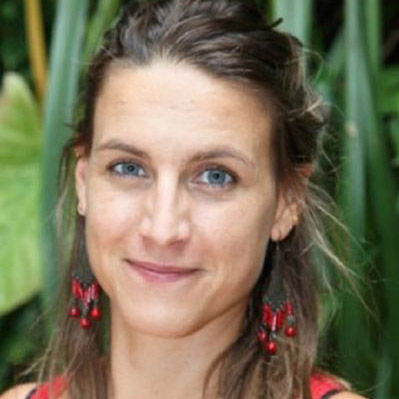
Julie Vercelloni
ACEMS AI Julie Vercelloni combines expertise in marine biology and statistics. She has worked with AIMS on a range of projects, with a current focus on the ReefCloud platform and Virtual Reef Diver. Julie’s broader research interests focus on combining state-of-the-art technologies offered by machine learning, remote sensing, and citizen science, including as part of the Virtual Reef Diver team, as well as Bayesian modelling to inform our understanding of complex problems related to coral reef conservation. Julie will commence maternity leave in mid-2021, and has sought funding via the Women’s Research Assistance Program (WRAP) scheme, to support continuation of her research including AIMS projects during this period, with the aim of supporting a handover to a research assistant before her leave commences.
Preserving ecological recovery of coral reefs is key for their conservation. Corals can take from years to decades to recover from a disturbance varying in space and time because of the action of interacting processes. Research collaborators including ACEMS AI Julie Vercelloni developed a hierarchical spatio-temporal model to explore the influence of space in recovery patterns of different types of corals and to predict their patterns at un-sampled locations.
Research collaborators led by ACEMS AI Julie Vercelloni used statistical modelling to explore the effects of broad‐scale climate‐related disturbances on benthic communities (including hard coral, soft coral, and algae) to predict their structure under scenarios of increasing disturbance frequency, and identify new research needs.
Anticipating future changes of an ecosystem's dynamics requires knowledge of how its key communities respond to current environmental regimes. The Great Barrier Reef (GBR) is under threat, with rapid changes of its reef‐building hard coral (HC) community structure already evident across broad spatial scales. While several underlying relationships between HC and multiple disturbances have been documented, responses of other benthic communities to disturbances are not well understood. This study used statistical modelling to explore the effects of broad‐scale climate‐related disturbances on benthic communities to predict their structure under scenarios of increasing disturbance frequency. During the survey of the reefs, there were two tropical cyclones and two heat stress events resulting in extensive HC mortality. This unprecedented sequence of disturbances was used to estimate the effects of discrete versus interacting disturbances on the compositional structure of HC, soft corals (SC) and algae.
Better understanding of the effects of multiple disturbances on benthic communities as a whole is essential for predicting the future status of coral reefs and managing them in the light of new environmental regimes. The approach that was developed opens new opportunities for reaching this goal.
Read more here
ACEMS has continued to support the collaborative (led by ACEMS researchers and AIMS is one of the many data/image contributors) Virtual Reef Diver project, including by maintaining the platform for data collection, providing education for and enabling citizen science observation data collection and classification of images. By harnessing citizen science participation, engagement, learning, and contribution of reef observation data and classification, trust in (and utility of) citizen science data is improved in this and in other conservation projects. Also see the Impact Case Study.
The Virtual Reef Diver platform and project harnesses the power of citizen scientists, to dramatically increase the amount of environmental monitoring data for the Great Barrier Reef, with crowd-sourced images and image classification. This provides valuable scientific information that reef managers can use to make better decisions at a scale not previously achieved.
The Virtual Reef Diver team won the APSEA Award for People & Community at the Asia-Pacific Spatial Excellence Awards (APSEA).
ACEMS researchers have also pursued and published research to increase trust in the use of citizen science data for scientific and conservation purposes (see the research on “Bayesian Item Response Models for Citizen Science Ecological Data” below).
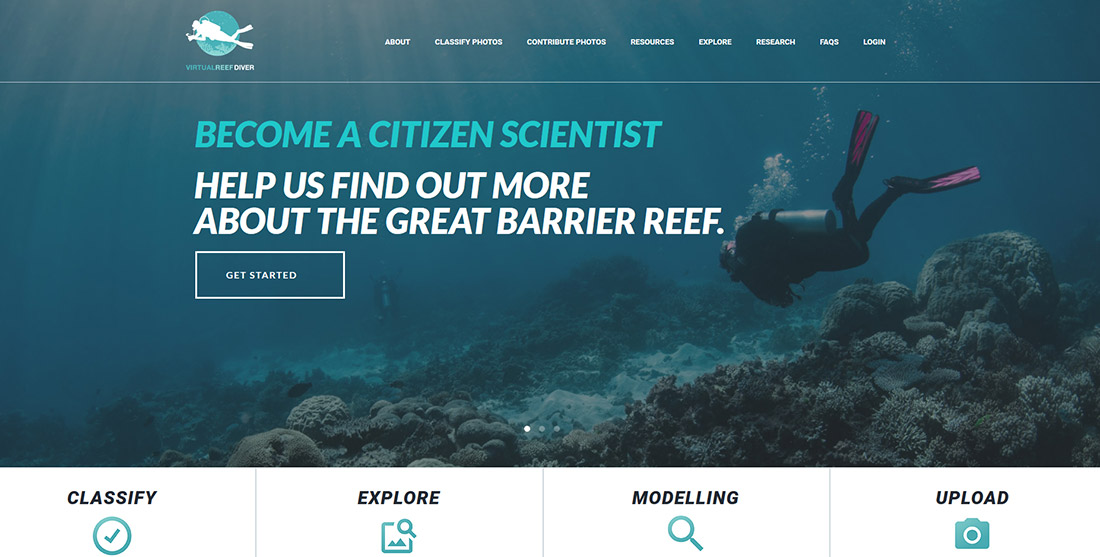
To help harness the great potential of citizen science in reef and other conservation science and management, ACEMS researchers have pursued research to increase the utility of and trust in citizen science ecological data. This includes published research on “Bayesian Response Models for Citizen Science Ecological Data” with a useful methodological framework and open source code for this purpose.
Harnessing Citizen Science for Ecology by Understanding & Addressing Limits
Certain challenges must be overcome to realise the potential of citizen science ecological data for conservation, including concerns within the scientific community regarding the quality and reliability of citizen science information, abilities of different citizen scientists, and how to use their data in research and models. ACEMS researchers, including AI Edgar Santos-Fernandez and CI Kerrie Mengersen, have looked at measures of citizen scientists’ proficiencies to account for task difficulties, for citizen science implementations. Specifically, they introduced a new methodological framework of item response and linear logistic test models with application to citizen science data used in ecological research. Their approach accommodates spatial autocorrelation within item difficulties and produces relevant ecological measures of species and site related difficulties, discriminatory power, and guessing behaviour. These, along with estimates of the citizen scientists’ abilities, allow better management of these programs and provide deeper insights. They also highlighted the fit of item response models to big data via divide-and-conquer. The researchers found their suggested methods outperform the traditional item response models in terms of RMSE, accuracy, and WAIC, based on leave-one-out cross-validation on simulated and empirical data. In addition to providing case studies of species identification, they provided multiple statistical illustrations and visualisations to allow extrapolation to a wide range of citizen science ecological challenges, and provided R and Stan codes for reproducibility and implementation by others.
Read the article here
The AIMS-ACEMS partnership has also enabled exploration of synergies between complementary platforms ReefCloud and Virtual Reef Diver, and supports further investigation into how best to harness AI, scientific expertise, citizen science, and now traditional knowledge, for marine monitoring and conservation. There may be new opportunities for geographical expansion, engagement, end users, and education, currently being explored.
Flagship Collaborative Platform Projects “ReefCloud” and “Virtual Reef Diver” for Reef Monitoring Harnessing Expert, Citizen Science, AI & Indigenous Knowledge*
AIMS and ACEMS are also exploring related research questions and opportunities to further enhance, develop, and increase engagement with and impact from these platforms, including by forming collaborations with Indigenous Organisations, commencing with ReefCloud, and engaging the public, schools, and tourists as Citizen Scientists via Virtual Reef Diver, offering complimentary benefits.
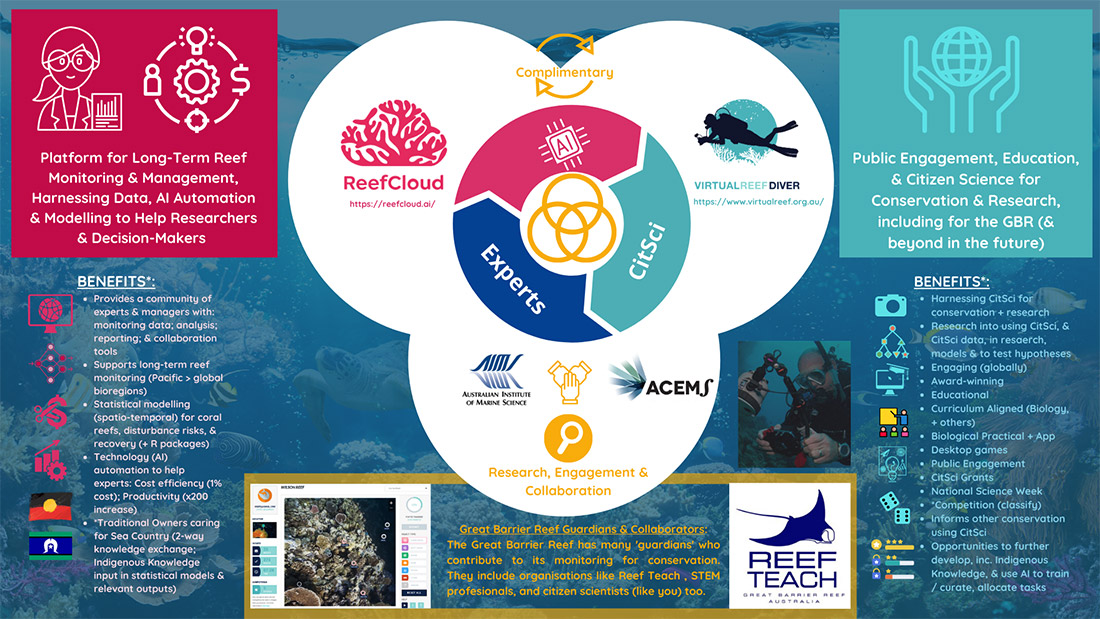
ACEMS looks forward to commencing a significant new research collaboration with AIMS and its Indigenous partner organisations in 2021, collaborating with Traditional Owners for two-way knowledge exchange and marine monitoring. The project will harness AIMS’ ReefCloud platform and expertise, Indigengous Organisations’ and Traditional Owners Indigenous local knowledge, and ACEMS capabilities both for this project, and looking ahead. ACEMS and AIMS collaborated to seek funding to support this project (including via the ARDC, WRAP, ACEMS ICSS, AIMS and QUT). Ultimately, co-funding, an external grant, and ACEMS ICSS scheme support will enable this project, which aims for environmental, cultural and other positive impacts.
Learn more about AIMS’ Indigenous Partnerships and the AIMS Indigenous Partnership Plan
Engagement Highlights
In 2020 engagements to support research collaboration and end-users for the planning, implementation and communication of research findings included:
- newly appointed AIMS-ACEMS RA David Warne making an extended researcher visit to AIMS in January 2020;
- multiple research planning sessions between a diversity of AIMS and ACEMS researchers and, as relevant, other stakeholders including ACEMS SEC and AIMS platform development team;
- at least seven research briefings by ACEMS for AIMS in relation to a Coral Recovery project;
- a joint research briefing by AIMS and ACEMS to scientists from the Office of the Great Barrier Reef, Department of Environment and Science; and
- AIMS’ attendance of events including ACEMS 2020 Virtual Annual Retreat.
AIMS-ACEMS Co-Funded Research Associate David Warne

David Warne, AIMS-ACEMS co-funded research follow
In 2020, then recently appointed AIMS-ACEMS co-funded research associate David Warne commenced the year with a visit to AIMS researchers, including AIMS PI Juan Ortiz and other collaborators, in Townsville Queensland.
David Warne has collaborated with the AIMS monitoring teams to quantify coral reef recovery more accurately. David investigates how mathematical modelling and computational statistics can provide insight into coral recovery processes on the Great Barrier Reef under increasing environmental disturbances. His main focus in 2020 was the recovery program, and supporting joint new funding efforts, and writing papers/posters. He’s been accepted to present his research at ANZIAM in February 2021.
In 2020, David Warne completed his PhD, had his contract extended to 2023 to continue work with AIMS (with support from AIMS and ACEMS QUT node) and received an ACEMS “Outstanding Achievement Recognition Participation Award” in recognition of his collaborative work with AIMS and ACEMS colleagues, in modelling resilience of coral reefs, and for his work on COVID-19, modelling global spatio-temporal patterns.
Public engagements in 2020
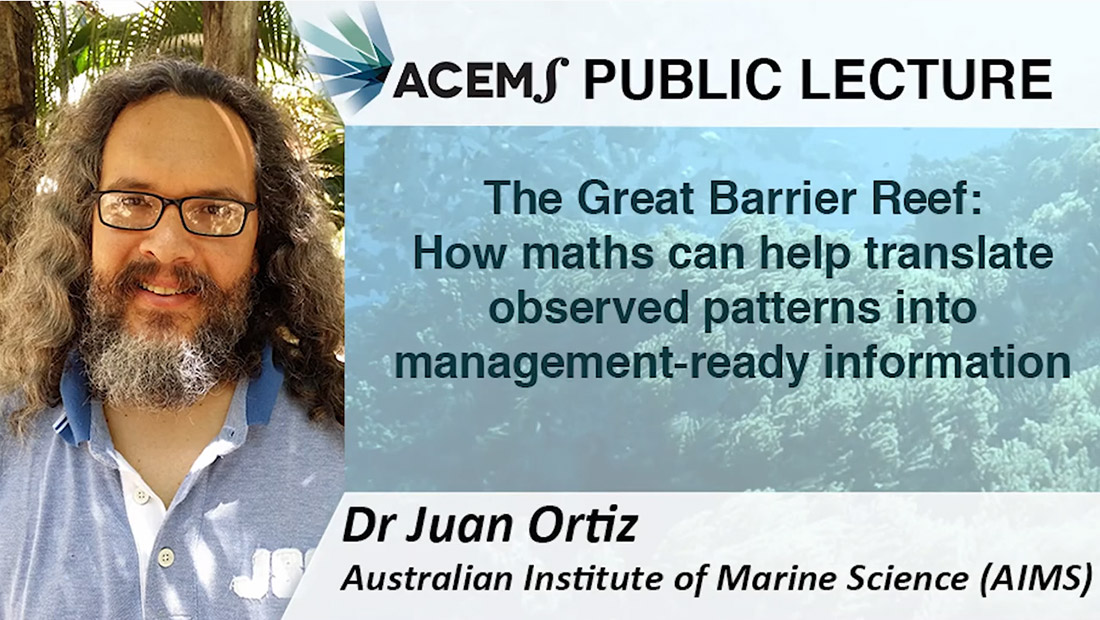
ACEMS PI Juan Ortiz, an ecologist and ecosystem modeller, delivered an ACEMS Public Lecture covering the following topics:
- looking at the Great Barrier Reef from organisms to ecosystems; and
- how maths can help translate observed patterns into management-ready information
- Watch Juan’s presentation
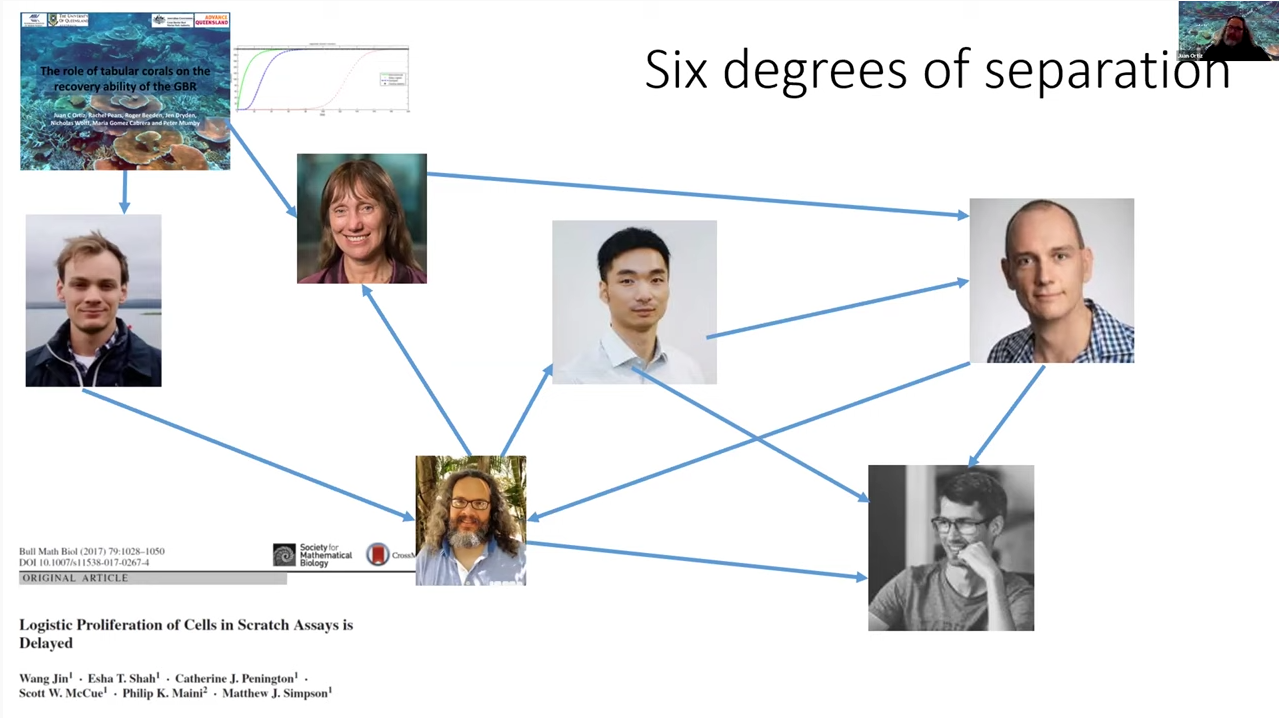
- AIMS attended the ACEMS 2020 Virtual Annual Retreat, with AIMS PI Juan Ortiz delivering a presentation at the Industry Session entitled “Partnering with Your Industry Partner: Why Solving Problems Together is the Way Forward”
- Watch Juan’s presentation here
- View the Coral Recovery research poster presented at ACEMS retreat
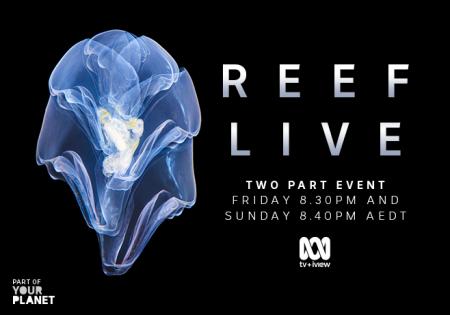
- ACEMS collaborative research with AIMS, including its Virtual Reef Diver project featured in ABC television program Reef Live.
- The two-part special (aired on ABC TV and streamed on ABC iview) celebrated the Great Barrier Reef and its annual reef spawning event for reef regeneration.
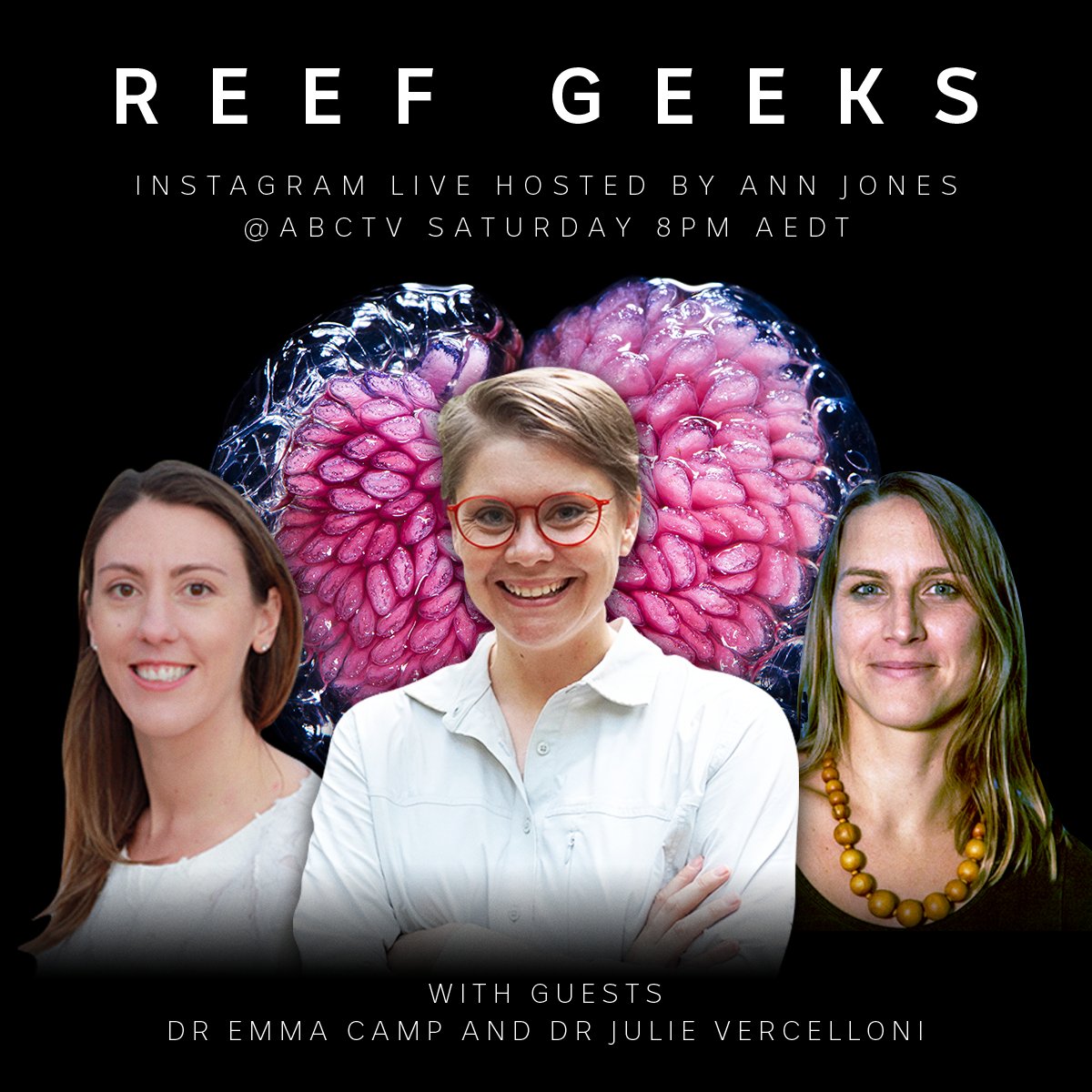
- Researchers from both AIMS and ACEMS featured in the ABC’s social media live Instagram special “Reef Geeks”.
- The show Reef Geeks was live from the Australian Institute of Marine Science, in Townsville.
- It featured interviews with Dr Emma Camp and with ACEMS AI Julie Vercelloni. It was also available on ABC TV.
2021 Outlook and Opportunities:
ACEMS AI Kate Helmstedt has proposed a new PhD student project in 2021, to develop optimal management approaches to sustain the Great Barrier Reef, by building new optimisation methods or building upon existing state-of-the-art approaches. Approaches that allocate resources in risky scenarios where investment options are correlated will be drawn from, to help accommodate significant and unavoidable uncertainties, stochasticity, and correlations between options. Investment in a diversity of new approaches aims to reduce volatility and help ensure environmental benefits in uncertain environmental futures in view of climate change impacting the Great Barrier Reef.
Another new AIMs-related project “Optimising Sampling Design for Model Discrimination of Coral Reef Recovery”has been proposed for an honours/Masters or PhD student to take up in 2021. Supervisors would be ACEMS Research Fellow David Warne, AI James McGree and CI Kerrie Mengersen.
AIMS and ACEMS look forward to continuing engagements and collaborations in 2021. This will include current projects (including ReefCloud and Virtual Reef Diver), new projects (including Two-Way Knowledge Sharing for Reef Monitoring with AIMS Indigenous partner organisations, and student projects), in and beyond 2021. AIMS and ACEMS QUT node will discuss a possible new post-doctoral (3 year) position.
Back to Partner Organisations